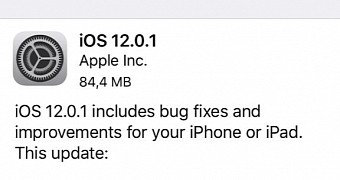Apple has just released iOS 12.0.1, and as per the company’s typical approach, downgrades to the previous major iOS release is no longer possible.
The Cupertino-based tech giant blocks downgrades to older iOS once it ships the first update to major versions. iOS 12.0.1 is the first such milestone for iOS 12, after the original launch last month.
What this means is that your iPhones and iPads updated to iOS 12.0.1 can no longer be downgraded to iOS 11 should you prefer the older version more. However, downgrades to iOS 12 are still allowed.
The iOS 12 push
According to third-party data, iOS 12 adoption isn’t going exactly as expected, though numbers appear to be a bit higher as compared to its predecessor.
iOS 12 is already installed on more than 50 percent of active devices, but this is a substantial decline versus the previous iOS updates that benefitted from faster adoption in the first weeks of availability.
Apple hasn’t updated its official figures just yet, and the iOS adoption rates continue to point to September 3 data when iOS 11 was still the latest version of the platform available.
Apple obviously expects most devices to update to iOS 12.0.1 as soon as possible, especially because it has included fixes that refine the performance of the original release launched in September.
For example, iOS 12.0.1 fixes a charging issue on the iPhone XS, as Apple claims that a number of units did not immediately charge when connected to a Lightning cable. There are also improvements for the Wi-Fi experience, with the company explaining that this update “resolves an issue that could cause iPhone XS devices to rejoin a Wi-Fi network at 2.4GHz instead of 5GHz.”
You can download iOS 12.0.1 right now on any supported iPhone and iPad, but if you’re planning to go back to iOS 11 anytime soon, you better wait until you make a final decision.

 14 DAY TRIAL //
14 DAY TRIAL //